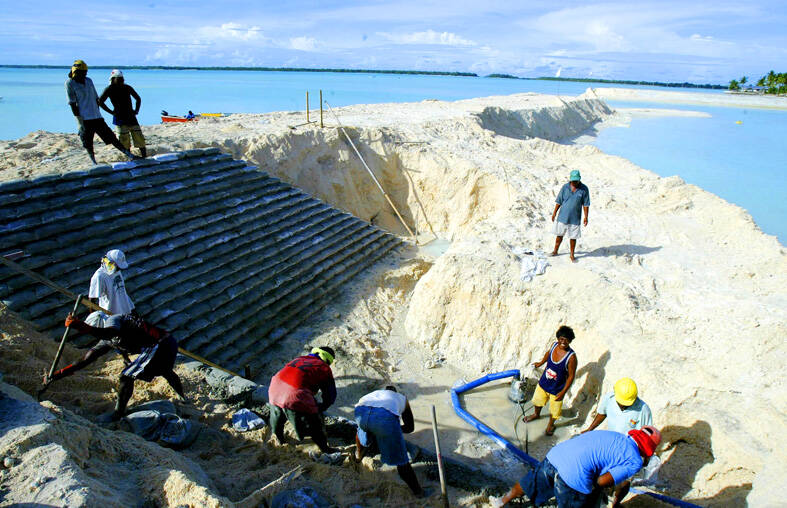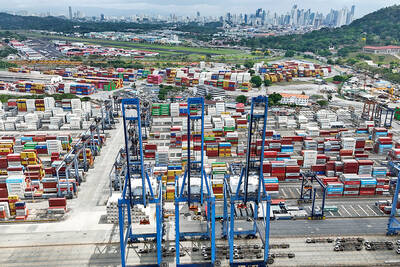Pacific nation Kiribati says it is exploring a deep-sea mining partnership with China, dangling access to a vast patch of Pacific Ocean harboring coveted metals and minerals.
Beijing has been ramping up efforts to court Pacific nations sitting on lucrative seafloor deposits of cobalt, nickel and copper — recently inking a cooperation deal with Cook Islands.
Kiribati opened discussions with Chinese Ambassador Zhou Limin (周立民) after a longstanding agreement with leading deep-sea mining outfit The Metals Co fell through.

Photo: AP
“The talk provides an exciting opportunity to explore potential collaboration for the sustainable exploration of the deep-ocean resources in Kiribati,” the government said on Monday evening in a statement.
Pacific nations Kiribati, Cook Islands and Nauru sit at the forefront of a highly contentious push to mine the depths of the ocean.
Kiribati holds rights for deep-sea mining exploration across a 75,000km2 swathe of the Pacific, in a region known as the Clarion Clipperton Zone. Through state-backed subsidiary Marawa Research, Kiribati had been working with Canada-based The Metals Co to explore the mineral deposits. However, that agreement was terminated “mutually” at the end of last year, the company told AFP.
A Kiribati fisheries official said the nation was now exploring opportunities with other foreign partners.
The Metals Co said Kiribati’s mining rights were “less commercially favorable” than other projects with Pacific nations Nauru and Tonga.
Kiribati’s announcement comes as international regulators begin a series of crunch meetings that could decide the fate of the nascent industry. The Metals Co and other industry players are pushing the International Seabed Authority to set rules allowing large-scale exploitation.
Kiribati, a climate-threatened archipelago that is home to about 130,000 people, lays claim to an ocean expanse that forms one of the largest exclusive economic zones in the world.
Kiribati President Taneti Maamau’s administration in 2019 severed diplomatic links with Taiwan in favor of China.
Chinese companies have in recent years been granted rights to harvest Kiribati’s profitable fisheries — one of the nation’s few natural resources besides minerals.
A visiting cadre of Beijing police have also visited the capital, Tarawa, to help train local Kiribati forces.
Tessie Lambourne, a leading member of Kiribati’s opposition, said China seemed to be seeking access to “our maritime space for its own interest.”
“I always say that our government is bending over backwards to please China,” she said.
China and Cook Islands last month struck a five-year cooperation agreement to study the Pacific nation’s seabed mineral riches. The deal did not include any exploration or mining license.
Companies hope to earn billions by scraping the ocean floor for polymetallic rocks, or nodules, that are loaded with manganese, cobalt, copper and nickel — metals used to build batteries for electric vehicles.
Nauru and Kiribati believe the industry holds the key to economic prosperity in a region where scarce land is already under threat from rising seas.
However, Palau, Fiji and Samoa are staunchly opposed, pushing for lingering environmental questions to be cleared up before anyone takes the plunge.

THE TRAGEDY OF PUNCH: Footage of the seven-month-old Japanese macaque has gone viral online after he was rejected by his mother and formed a bond with a soft toy A baby monkey in Japan has captured hearts around the world after videos of him being bullied by other monkeys and rejected by his mother went viral last week. Punch, a Japanese macaque, was born in July last year at Ichikawa City Zoo. He has drawn international attention after zookeepers gave him a stuffed orangutan toy after he was abandoned by his mother. Without maternal guidance to help him integrate, Punch has turned to the toy for comfort. He has been filmed multiple times being dragged and chased by older Japanese macaques inside the enclosure. Early clips showed him wandering alone with

South Korea would soon no longer be one of the few countries where Google Maps does not work properly, after its security-conscious government reversed a two-decade stance to approve the export of high-precision map data to overseas servers. The approval was made “on the condition that strict security requirements are met,” the South Korean Ministry of Land, Infrastructure and Transport said. Those conditions include blurring military and other sensitive security-related facilities, as well as restricting longitude and latitude coordinates for South Korean territory on products such as Google Maps and Google Earth, it said. The decision is expected to hurt Naver and Kakao

Australian Prime Minister Anthony Albanese yesterday said he did not take his security for granted, after he was evacuated from his residence for several hours following a bomb threat sent to a Chinese dance group. Albanese was evacuated from his Canberra residence late on Tuesday following the threat, and returned a few hours later after nothing suspicious was found. The bomb scare was among several e-mails threatening Albanese sent to a representative of Shen Yun, a classical Chinese dance troupe banned in China that is due to perform in Australia this month, a spokesperson for the group said in a statement. The e-mail

‘OCCUPATION’: Hong Kong said it had lodged ‘stern protests’ with Panama’s consulate, and would ‘staunchly support’ the rights and interests of Hong Kong companies Panamanian President Jose Raul Mulino on Monday ordered the temporary occupation of two ports run by a unit of CK Hutchison Holdings Ltd following the Supreme Court’s ruling against the firm’s concession, escalating a dispute that has become a proxy battle between the US and China in Latin America. Mulino said in a speech that the administration and operation of the two ports on the strategic Panama Canal is to revert to the country’s National Maritime Authority to ensure their uninterrupted, safe and efficient operation. The occupation covers movable equipment at the ports and does not mean a definitive loss of